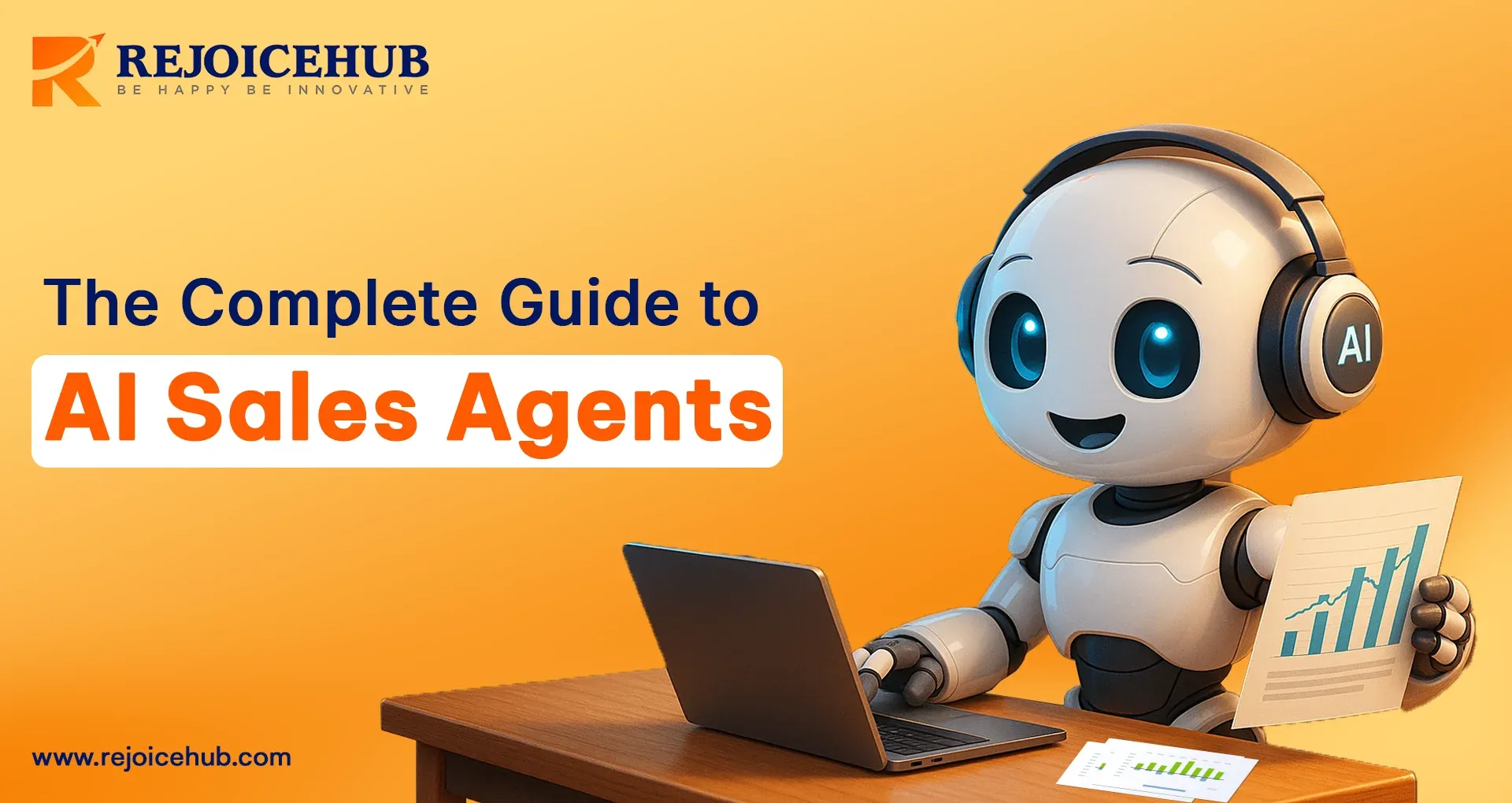
If you have a startup, and suppose you have a sales representative who never sleeps and keeps replying to your customers 24/7 and keeps learning from each of your customer interactions, it sounds quite imaginary, but in reality, in today's LLM world, AI sales agents have been developed, who can easily manage sales, that too without any salary or time wastage.
In recent years, I have personally experimented with many AI agents on CRM platforms and automation tools. I was surprised by how naturally they were able to handle conversations, cultivate leads, and even foresee buying tendencies. We have reached a stage where these agents are not simply chatbots; they are intelligent, self-governing, digital co-workers, changing the way modern sales teams function.
In this comprehensive article, we will address everything you need to learn about AI sales agents, looking at not only how they function but specifically how they are changing business outcomes. You will also learn about the setup, true use cases, benefits, and emerging trends influencing the future of AI-delivered sales.
Quick Summary
AI sales agents are autonomous digital systems that use artificial intelligence, automation, and real-time data to perform sales-related tasks. They can manage inbound leads, personalize customer communication, create quotes or invoices, and even train sales reps, all with minimal human supervision.
With features like 24/7 availability, scalability, data-driven accuracy, and customization, AI sales agents are helping companies save time, cut costs, and boost productivity. In short, they're not replacing humans; they're empowering them.
Our focus in this article:
1. What are AI sales agents?
2. What are the benefits of AI sales agents?
3. Why are AI sales agents so important, and how do they work?
What is an AI sales agent?
An AI sales agent is an intelligent virtual agent that executes sales-related tasks utilising AI technologies such as machine learning (ML), natural language processing (NLP), and automation. These agents evaluate customer data, comprehend customer behaviour, and take initiative to answer requests, schedule demos, or qualify leads.
AI sales agents function independently; they can reason, learn, and take action without human oversight. They operate directly in your CRM or through channels such as email, WhatsApp, and chat, and provide you with the benefit of using the workflows you already have.
The first time I tried one of these tools, what I found remarkable was how fast it was able to pull a customer's history from CRM, personalize a conversation with the customer, and even propose upsell opportunities in real time during a chat. It was like having a brand new sales rep that already knew everything about our clients.
Mostly, AI sales agents will do:
- Automate repetitive tasks like follow-ups and data entry.
- Learn from every customer interaction.
- Take advantage of contextual understanding to react to complex sales scenarios.
- AI sales agents don't seek to replace human reps; they seek to improve their efficiency and productivity.
How AI Sales Agents Operate
AI sales agents function via a lot of data integration, intelligent automation, and continuous learning. Let's take a look at how the setup process usually works, based on what I've seen and found to be the best setup framework currently.
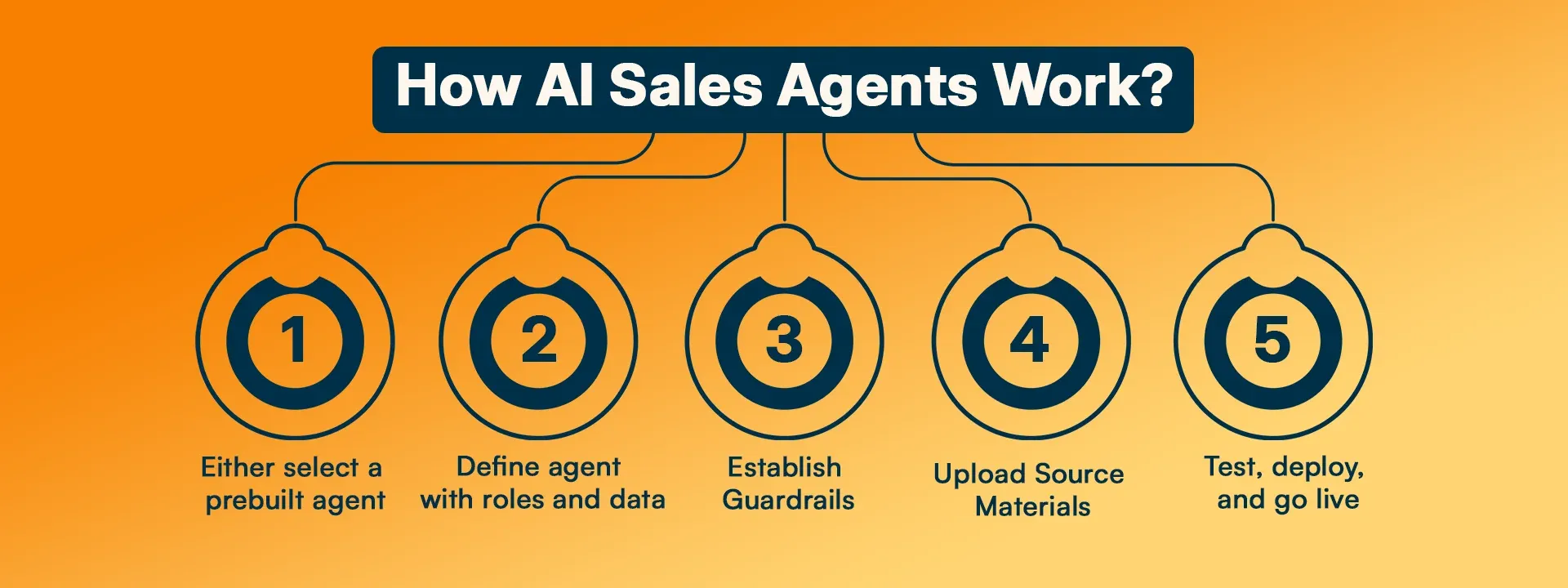
1. Either Choose a Prebuilt Agent
Most vendors have assembled prebuilt agents that are designed for a specific function, lead nurturing, billing, etc. You can then deploy these prebuilt agents immediately or customize them to suit your business process.
When I first tested a prebuilt agent, I connected it to my CRM in under ten minutes. The prebuilt agent immediately started capturing leads, logging information and then scheduling follow-ups.
2. Define Agent with Roles and Data
Now, you can give your agent its name, its objective, and what access it will need. For example, you could define one agent as a "Lead Qualification Assistant" and another agent as a "Sales Coach."
You'll also want to connect pertinent data from the CRM so that the agent knows what to analyse and act on, like customer history and deal stage.
3. Establish Guardrails
Every AI requires a guardrail. Guardrails ensure you're maintaining compliance, data privacy, and ethical use. You can establish specific guidelines, such as when to send an email, how to respond to items involving sensitive information (i.e., HIPAA), and the tone you want the agent to use in communication.
Guardrails will ensure the keep your brand voice sounds consistent, and will help to maintain customer data integrity.
4. Upload Source Materials
Agents learn best when they are trained on your company's content. This could include uploading company FAQs, policy documents, or product sheets. Once documents are uploaded, your AI will provide responses to customers accurately and with confidence.
5. Test, Deploy, and Go Live
After everything has been configured, it is time to test your AI agent in real-world conditions. You will be able to ask sample queries, review the outputs, and consider if the responses meet what you want to occur. Once you are comfortable with the agent, deploy the agent live, and watch as it interacts with customers in real time.
Advantages of AI Sales Representatives
To be honest, when I first heard about AI representatives, I thought they would be primarily for basic automation. However, after a few months of testing, it has become clear to me that their true value is much more than time savings. They can truly change the sales funnel.
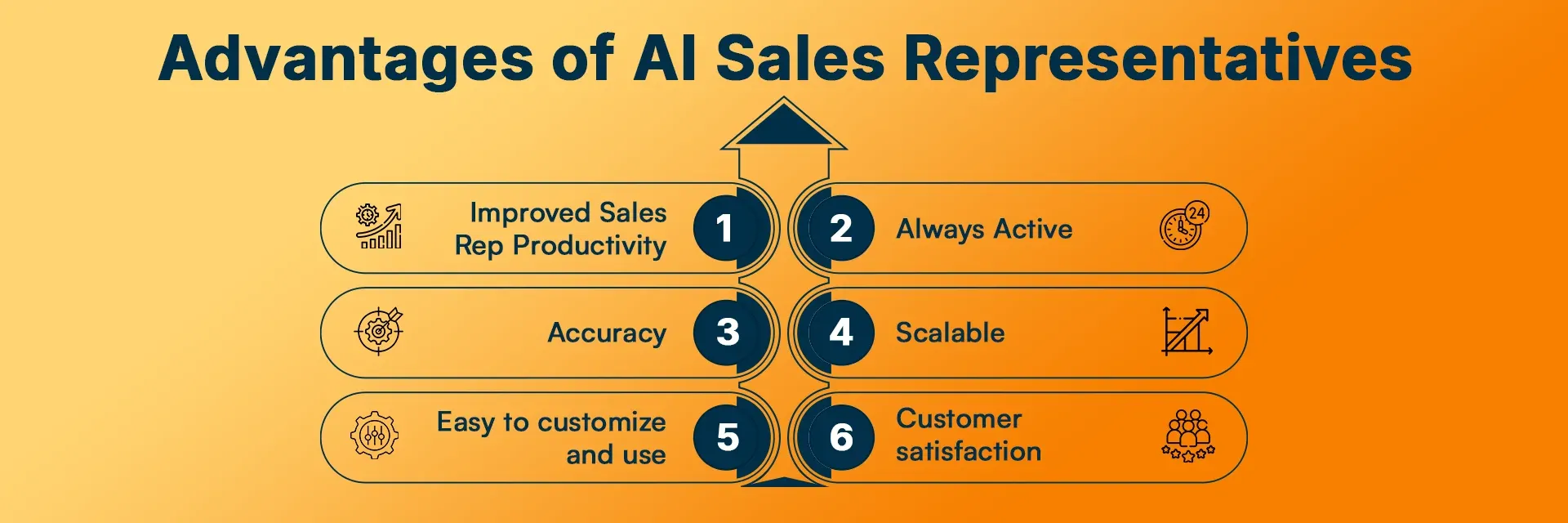
1. Improved Sales Rep Productivity
Sales Reps spend only about 28% of their time actually selling; the rest of their time is spent on key performing tasks, including administration, research, and data entry. AI sales representatives can assume the role of replicative work, allowing sales Reps to focus their efforts on closing business.
An illustration may help. One of my clients employed an AI SDR (Sales Development Representative) agent who qualified inbound leads automatically; this allowed their SDRs to focus on high-value prospects. The outcomes were a 40% increase in deal closure rates.
2. Always Active
Humans require time off, AI does not. Your agent does not need a coffee break; it is always active. This means your agent, who is also monitoring activity outside normal business hours for inquiries, shining conversations, and lead nurturing, will respond to every inquiry 24/7, or even across time zones, while you sleep or take time off.
This awareness improves response times for each inquiry, and the guests do not have to wait to hear back from the team, which presents better overall conversion opportunities.
3. Accuracy
AI sales agents leverage clean and structured data. That means fewer manual errors, accurate record keeping and straightforward, precise communication, especially when quoting or billing.
4. Scalable
AI scales easily, whether you have 100 leads or 10,000. You can add more agents or expand workflows without needing to hire additional reps. This leads to lower costs as your business grows.
5. Easy to Customize and Use
No-code and low-code platforms now allow teams to customise or create new AI agents without technical expertise. You can literally state in natural language what you want the agent to do, and it does it.
6. Customer Satisfaction
When replies are fast and accurate, customers start to trust that you have their best interests in mind. Additionally, AI software can remember answers in past conversations, ensuring some consistency from one chat to the next. This human-like memory promotes better customer experiences and, in turn, higher customer satisfaction scores.
Different Types of AI Sales Agents
In my experience, all AI agents can be grouped into two main types, and the two categories are designed for different levels of autonomy and interaction.
1. Autonomous AI Sales Agents
Autonomous AI sales agents act without much involvement from a human being. They take input data and make decisions and actions without a human.
- Example: A prospect downloads your eBook from your website. The AI agent sends them a thank you message, answers any product queries they may have, and schedules a demo, all without any human interaction.
- Best used for: Lead generation, scheduling, and outreach.
2. Assistive AI Sales Agents
Assistive sales agents work alongside sales and customer service representatives. They do not replace a human, but assist the human with insights, decision suggestions, or suggestions to automate some sort of action.
- Example: During a sales call, an assistive agent may be monitoring the call. If a customer questions a purchase, the agent can pull up the customer's purchase numbers and recall the items that were purchased. The agent can even, possibly, suggest a product bundle or the best discount to mention to the prospect.
- Best used for: Sales training, coaching, or data support.
Important Characteristics and Functions of AI Sales Agents
Upon starting your research into AI sales agents, one thing is certain: these are more than just "fancy" chatbots. These are well-constructed digital assistants that embody actual intelligence. After having experienced several AI tools firsthand, I can assure you that the qualities below will truly change the way sales teams work together.
1. Active Learning and Responsive Adaptation
AI agents learn as they operate. Each conversation, each click, each behaviour from users becomes part of their training. With time, they learned how your customer thinks, the questions they tend to ask, and can make adjustments to responses.
For example, when I was utilising an AI SDR agent for a SaaS build, it began determining which type of prospects would convert faster, and actually would auto-prioritise those types of profiles.
2. CRM System and Omnichannel Connectivity
A quality AI sales agent will connect seamlessly with a CRM system such as Salesforce, HubSpot, or Zoho, and connect with your communication systems (email, chat, WhatsApp, or voice).
This means you will not have to do any manual data entry; all chat records will auto-log each conversation, which provides a centralised record of communications that have occurred with the customer.
3. Ability to Change Language and Tone
Today's AI agents can switch languages and tone based on the audience. Selling to a U.S. client? The agent can be all peachy and straightforward. Speaking to a Japanese prospect? The agent can adapt to a more formal, polite tone.
This ability earns trust with your brand across multiple audiences.
4. Built-in Compliance and Data Guardrails
Data privacy is very important. The top AI systems will come with guard rails that unequivocally outline the usage of personal data and keep unauthorised access at bay, retaining the proper tone for the brand.
This is most valuable in highly regulated industries like finance and healthcare, where a mistake could be expensive.
5. Analytics Dashboards and Performance Metrics
But the real value added is in insights - tracking engagement metrics like response rates, conversion rates, lead score, etc., and displaying that on a visual dashboard so sales leaders can make decisions impacted by data, rather than gut feeling.
Significant Applications for AI Sales Agents
The flexibility of AI sales agents is their real power. Here is the way in which they are being employed by modern sales organizations:
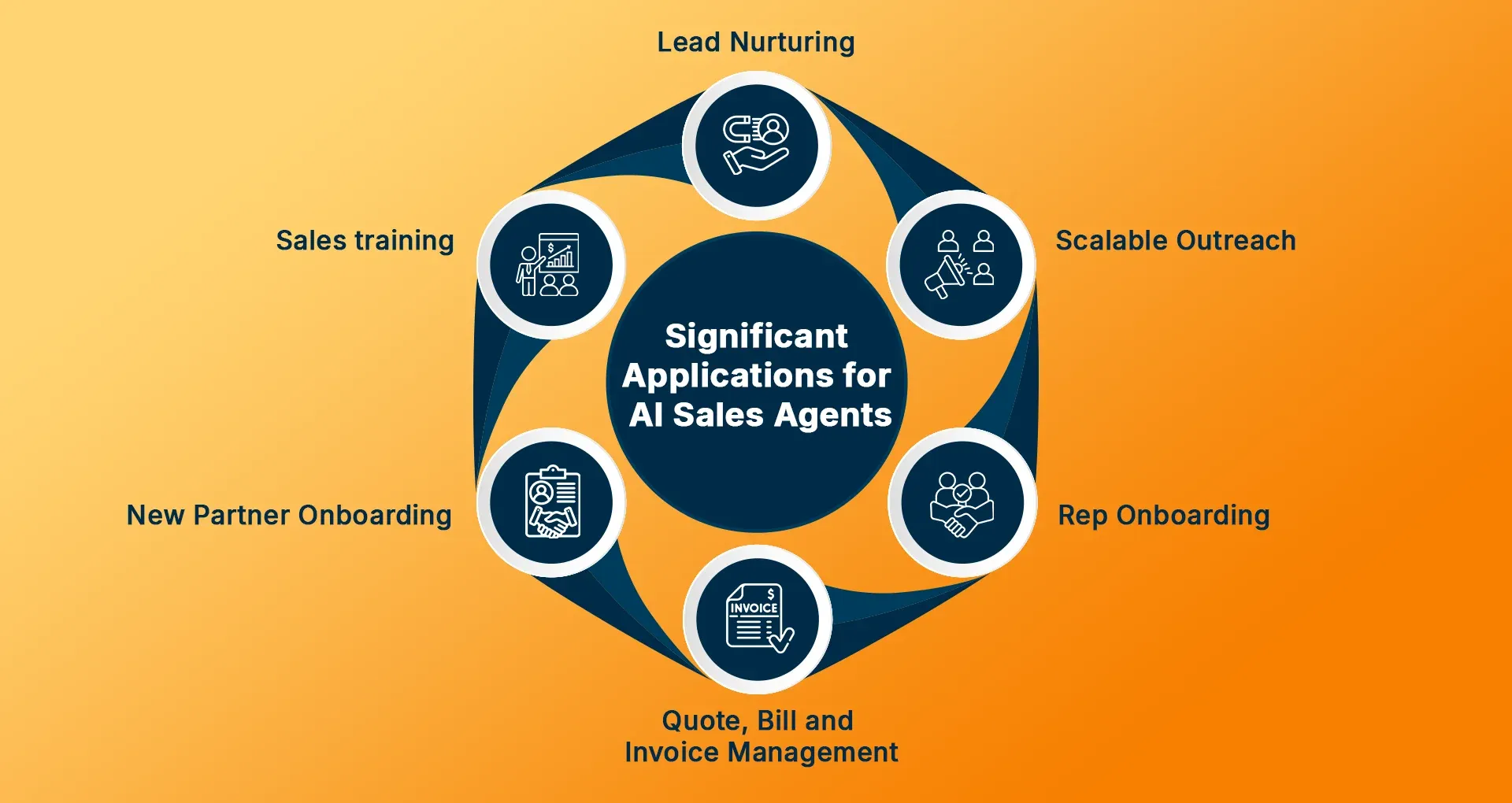
1. Lead Nurturing
AI agents engage with leads instantly when they land on your website or download something. They can answer FAQs, qualify leads, and set up demos, ensuring no lead ever goes cold.
2. Scalable Outreach
Agents can send thousands of personalised messages or follow-ups based on user activity, such as opening their email or expressing interest in a product. It's like having an entire outreach team working 24/7.
3. Rep Onboarding
AI agents can train new sales reps by means of simulation, real-time feedback and company-specific instruction. This compresses the onboarding cycle and enables new hires to ramp up more quickly.
4. Quote, Bill and Invoice Management
Consider having an agent that generates price quotes, sends invoices, and tracks payments, all integrated with your CRM. An automated process can save your staff hours of manual work weekly.
5. New Partner Onboarding
AI can facilitate partner training, certification tracking, and workflow setup, ensuring partner networks are consistent without needing to manage each partner manually.
6. Sales Training
AI coaching agents can role-play buyer scenarios, review tonality, and provide constructive critique, transforming training into a continuous performance-based initiative.
AI Sales Agents and Old-School Sales Automation Tools
In today's world, many people conflate AI agents with traditional automation tools (like CRM automation or workflow bots). However, there are significant differences. Let's clarify.
| Feature | Traditional Automation | AI Sales Agents |
|---|---|---|
| Decision-making | Rule-based | Data-driven and adaptive |
| Learning ability | Static scripts | Learns and improves over time |
| Context understanding | Limited | Deep contextual awareness |
| Personalization | One-size-fits-all | Dynamic, user-specific messaging |
| Integration | Requires manual setup | Seamlessly connects with CRMs and APIs |
| Response tone | Robotic | Natural and conversational |
In summary, while traditional automation performs tasks, AI sales agents think, analyse, and adapt.
When I switched from rule-based automation to AI-driven outreach, I noticed a significant increase in engagement because the agent was able to personalize each follow-up email depending on customer behaviour and engagement.
Choosing the Right AI Sales Agent for Your Business
There are a lot of options available today. From a simple chat-based bot to enterprise-level AI platforms, the possibilities are vast. Here is how I would recommend that you narrow it down.
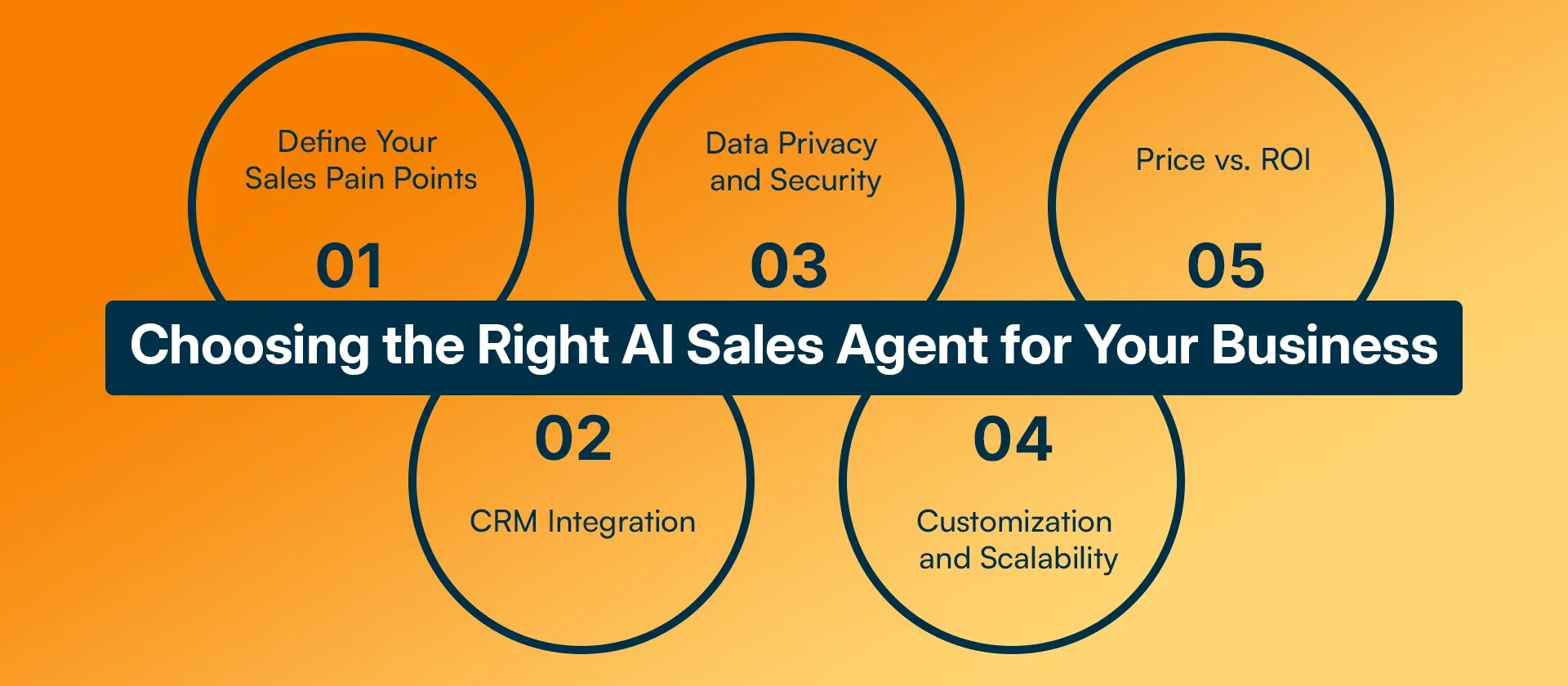
1. Define Your Sales Pain Points
Before comparing the features within your shortlisted agents, ask yourself: what is slowing your sales team down? Lead response time? Manual quoting? Onboarding?
Once you identify your bottleneck, you will be able to choose an agent that fits your use case.
2. CRM Integration
Always be sure your AI agent integrates with your CRM (customer relationship management platform). If you do not have a compatible agent, this could generate a data silo and inefficiency.
3. Data Privacy and Security
Pick a provider that is compliant with GDPR, ISO 27001, or SOC 2. You should not take chances when it comes to data security.
4. Customization and Scalability
Every business changes. Choose an agent with low-code or no-code workflows, and you will stay ahead of your sales process as it expands.
5. Price vs. ROI
Look for value, not "cheap." A $20/mo. agent that and saves each rep even 10 hours per week is a much better value over the next 12 heading into this decision than a $0/mo. agent that you are paying for by prolonging quotes and booking calls.
A Step-by-Step Process for Implementation for Businesses
One of the biggest missteps that companies make is to adopt AI quickly, without plans or meaningful consideration. Based on my experience implementing AI solutions, I have included a validated step-by-step process that will help make sure your AI sales agent, or anything else you decide to build or adopt, will lead to a meaningful return on investment.

Step 1: Pre-Assessment and Goal Setting
First, and foremost, think about the actual goal that you want the agent to accomplish. For instance, faster lead response time? Automatic billing? An improved onboarding process? Setting a clear target will position you to measure ROI at a later date.
Step 2: Data Preparation and Integrating the AI into your Current Systems
AI is only as smart as the data it learns from. It is important to ensure that your data in your customer relationship management tool (CRM) is cleaned up, organised and is as current as possible.
Once you take care of this, the next step will be to integrate the AI agent into your current systems; for instance, is the AI going to be integrated into your CRM, ERP, or help desk tools?
Step 3: Set Guardrails and Train the Agent
This is where you will upload anything that you want the agent to know, like FAQs, documentation, product sheets, policies, etc.
Define rules of limitation for how far the agent could deviate from your company's policies. For example, you may want to write,
"Do not share internal pricing sheets with customers unless a human sales rep has approved it."
Step 4: Pilot Testing
Before you fully roll out, test your AI in a scoped environment. For example, only test with inbound inquiries or a single product line at near-zero intensity.
Use this opportunity to gather data, refine, and find inaccuracies and errors.
Step 5: Full Rollout with Human Oversight
Once you are assured of your agent's stable performance, it's time to roll out your agent to all channels, email, voice, WhatsApp, etc. During the first two or three weeks, you will want to monitor just about everything the agent produces. Use this time to confirm accuracy and proper tone.
Step 6: Performance Review and Ongoing Improvement
Use analytic measures to assess how the AI is performing. For example, if your lead conversion increased or response time decreased, you now know that your AIs engage your customers. Continue to refine prompts and update training data on a regular basis.
Also Read: 11 Best AI Agents for Automating Business Workflows in 2025
Common Mistakes to Avoid When Deploying AI Sales Agents
As someone who has developed AI solutions, I've observed companies fall into familiar traps that can reduce their chances for success.
Let me highlight the biggest traps to avoid:
1. Poor Data Quality
When AI is built using poor or stale data, it will not produce good outputs. Clean and segment datasets prior to AI configuration.
2. Skipping Human Review
There should never be any AI configuration times when we deploy AI without human testing. Even AI with the best data source may contextually misunderstand. We need to keep ourselves in the testing loop while AI is in its discovery phase.
3. Lack of Defined Goals
As important as it is to have good data, it is to define what good looks like: faster reply, more demos, more conversions. If good is not defined, we cannot measure the impact.
4. Over-Reliance on AI
AI is just meant for the project; it is not designed to replace. Businesses that removed any human contact to the point of no human contact lost customer trust.
5. Ignoring Feedback Loops
We need to leverage customer feedback and employee feedback loops to refine the training cycle of the AI configuration so that we do not lose sharpness of response.
Real-World Use Cases and Success Stories
To fully grasp how disruptive and helpful AI sales agents can be, let's investigate real-life success stories that were influenced by brands and professionals who are already employing this technology.
Case Study 1: SaaS Startup Ramps Up Lead Conversion by 70%
A small SaaS business embedded an autonomous AI SDR agent to qualify inbound leads from their website.
Before AI, it could take sales a full 24-48 hours to respond. After deployment, the leads received a personalized response within 10 seconds, and the result was a 70% lift in qualified demo bookings.
Case Study 2: E-Commerce Brand Cuts Support Costs 35%
An e-commerce brand trained an AI sales assistant to answer frequently asked order questions, process returns, and update die-hard customer product recommendations.
This leads to a dramatic reduction in human forms of work, saving them over $40,000 per year, while improving response time and customer service satisfaction.
Case Study 3: Financial Services Company Makes Sure Information Is Accurate
A finance company utilised AI agents to generate quotes and for the billing process. In addition to creating these items, the system would cross-verify data inputs and financials from their product, the accounting software QuickBooks. The biggest takeaway was that AI sent invoices to its customers, with 0% manual errors.
This dramatically increased the customer trust from its B2B clients, from 89% accurate reporting to 99.8%.
Case Study 4: AI-Powered Training Enhances Sales Representatives' Performance
A multinational technology firm leveraged an assistive AI "Sales Coach" that simulated direct client interactions and provided instantaneous feedback on the performance.
In three months, average sales call quality scores increased by 45%.
There are lessons here, and these demonstrate one point absolutely: AI sales agents do not merely automate; they enhance.
The Global Impact of AI Sales Agents on the Workforce
AI is changing how teams think outside the box worldwide, and more than efficiency, AI is taking roles to new, defining levels.

1. The Shift to Value-Based Roles
As automation takes away routine work, sales professionals can spend more time on strategy, storytelling and relationship work.
2. New Roles
The titles "AI Sales Strategist," "Prompt Designer," and "AI Data Supervisor" are popping up in almost every industry.
3. Need for Skill and Training
Now companies are training employees to manage AI agents and benefit from them, not to compete against them.
4. Economic Access
AI tools allow small businesses an equivalent level of automation and data tools to compete with large companies.
Implementation Challenges for an AI Sales Agent
No technology is perfect. Based on my experience, here are some of the challenges organizations will face when implementing AI sales agents, and how to navigate those challenges.
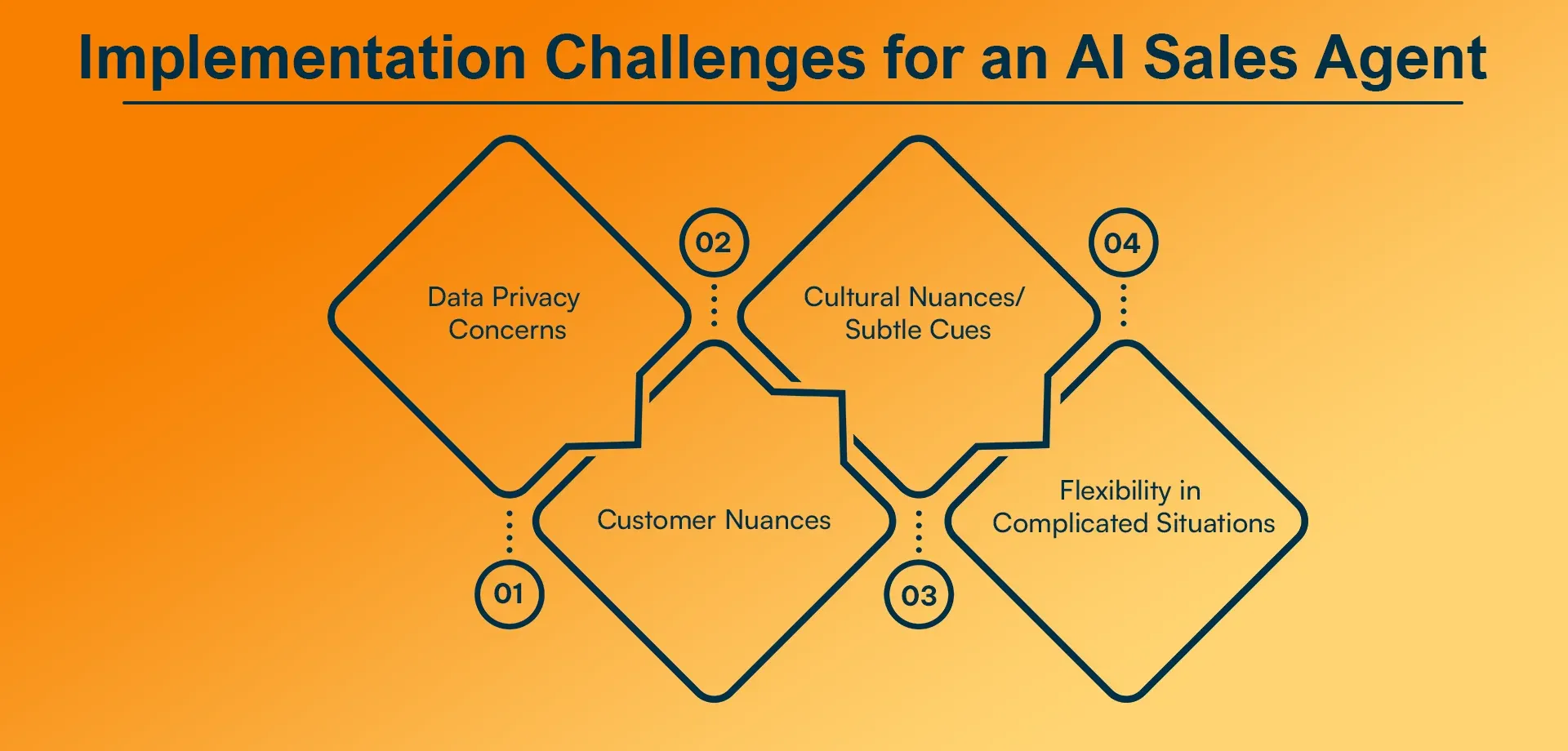
1. Data Privacy Concerns
AI agents must rely on sensitive data, customer information, sales data, etc. You must always follow applicable regulations such as GDPR, CCPA, etc. Always install strong data encryption and access controls.
2. Customer Nuances
The AI can communicate naturally, but does not have emotional intelligence. A customer's sarcasm or indications of hesitation will not be captured. Therefore, we must incorporate human and AI touch points for natural, authentic communication.
3. Cultural Nuances/ Subtle Cues
When companies are selling globally, they will have to deal with cultural differences. There are times the AI will misinterpret tone or context across languages. Training your agents on localized data and brand tone will address this issue.
4. Flexibility in Complicated Situations
AI has problems when conversations don't go as planned. This is where escalation processes that allow for a smooth and easy transfer of the conversation to a human agent become most helpful.
Future Expectations for AI Sales Agents
Based on what we've seen previously, AI sales agents are about to get even smarter, more human, and more proactive. Here's what we can expect:
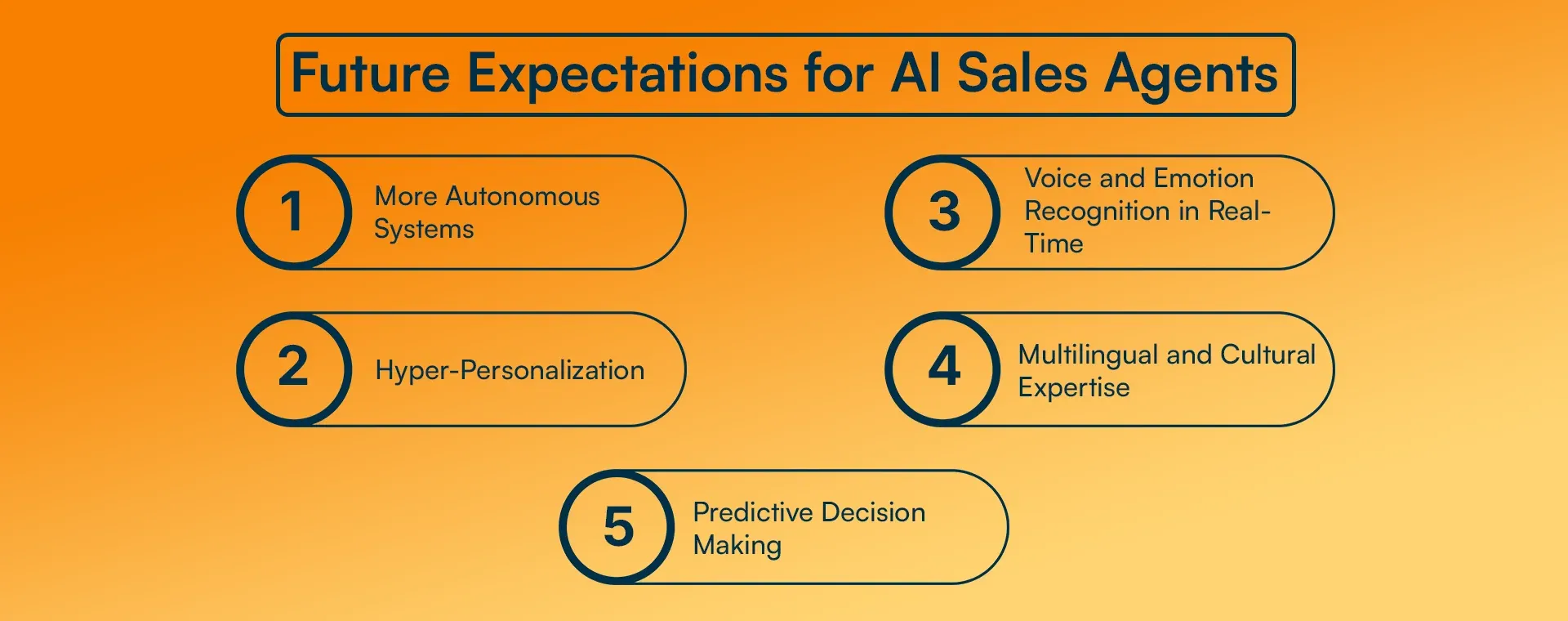
1. More Autonomous Systems
By 2027, more than half of companies leveraging AI will try fully autonomous agents that will manage entire sales sequences from prospecting to closing.
2. Hyper-Personalization
Agents will soon leverage real-time behavioural data to create hyper-personalised sales journeys for each customer. Rather than generic follow-ups, every piece of communication will feel tailored.
3. Voice and Emotion Recognition in Real-Time
Many of the new artificial intelligence voice agents are beginning to distinguish tone and sentiment in phone calls, enabling representatives to adjust their communication strategies in real-time during conversations.
4. Multilingual and Cultural Expertise
Agents will recognize regional nuances, tone, and culture in the future to provide localised experiences across various countries.
5. Predictive Decision-Making
Artificial intelligence will soon be able to anticipate customer objections to sales, recommend next-best actions and rate the likelihood a deal will happen in potential risk, moving from reactive sales management to proactive selling processes.
Conclusion
AI sales agents have now become essential components of high-performing sales teams, as opposed to being futuristic extras. I've seen firsthand, AI agents change not only the way we sell, but connect with customers.
The ease with which AI enables consumer engagement, removes humans from the mundane, and makes tremendously faster data-driven decisions, freeing human potential, is staggering.
For small start-ups to large global companies, adding AI sales agents can supercharge team capacity, skyrocket lead conversion, and have a 24/7 customer engagement strategy. If you're a startup founder or agency owner, and you want to deploy AI sales agents in your business, then you can prefer firms like Rejoicehub
My Recommendation: I think balance is essential, let AI handle what it does best (speed, scale, data), and let humans do what they do best (empathy, trust, and relationships).
Frequently Asked Questions
1. What is an AI sales agent?
An AI sales agent is a smart application that may automate sales processes, such as identifying qualified leads, sending outreach emails, and engaging with customers, using machine learning models and automation.
2. How is an AI sales agent different from a chatbot?
Chatbots follow predetermined scripts, whereas AI sales agents learn from data, automate autonomous decision-making, and integrate further into CRM applications.
3. Will AI sales agents replace the need for human sales reps?
No. AI sales agents support human teams by taking care of repetitive processes while human sales reps focus on building trust and closing sales.
4. How do AI sales agents integrate with existing CRMs?
AI sales agents will integrate with tools such as Salesforce, HubSpot, or Zoho and will pull customer data and automate the process directly.
5. Are AI sales agents safe for customer data?
As long as the company has strong guardrails and compliance policies in place, AI sales agents will not be dangerous to customer data.
6. Which sectors can benefit from AI sales agents?
Almost all of them, from SaaS to e-commerce to finance to healthcare, wherever lead generation and customer interaction are important.
7. How much do AI sales agents typically cost?
Cost is relative and varies based on the service provider, but there are typically free introductory tiers through enterprise solutions, based on scale and feature depth.
8. How do AI agents improve over time?
Using a machine-learning approach, AI agents analyse previous conversations, what customers are saying about those conversations, and performance data to improve future outcomes.
9. Can AI sales agents do voice-based interactions?
Sure, Most AI voice agents can facilitate calls, schedule appointments, and even show customer sentiment in real-time conversations.
10. What are the biggest drawbacks of using AI in sales?
Data privacy, reading subtle emotional cues, and being able to change course in unpredictable situations are the main drawbacks.
